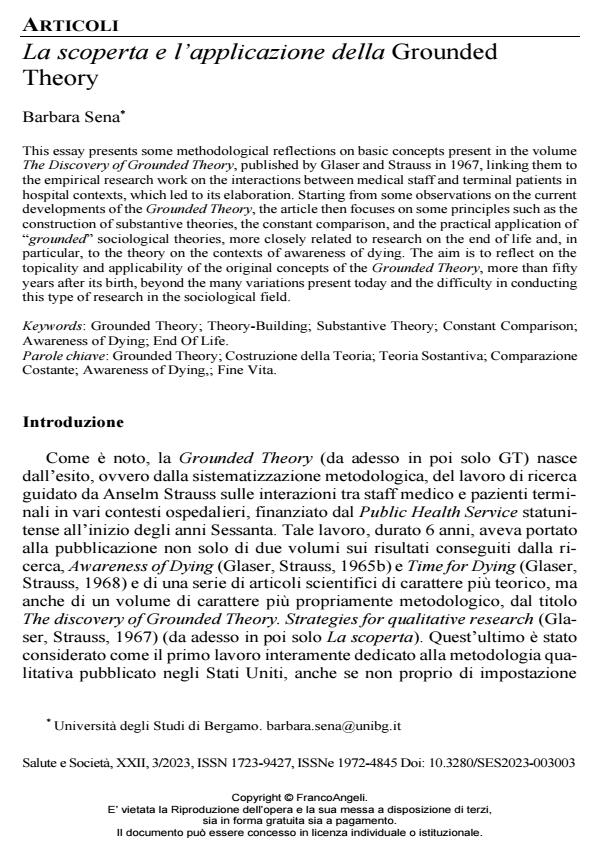La scoperta e l’applicazione della Grounded Theory
Titolo Rivista SALUTE E SOCIETÀ
Autori/Curatori Barbara Sena
Anno di pubblicazione 2023 Fascicolo 2023/3
Lingua Italiano Numero pagine 14 P. 33-46 Dimensione file 442 KB
DOI 10.3280/SES2023-003003
Il DOI è il codice a barre della proprietà intellettuale: per saperne di più
clicca qui
Qui sotto puoi vedere in anteprima la prima pagina di questo articolo.
Se questo articolo ti interessa, lo puoi acquistare (e scaricare in formato pdf) seguendo le facili indicazioni per acquistare il download credit. Acquista Download Credits per scaricare questo Articolo in formato PDF

FrancoAngeli è membro della Publishers International Linking Association, Inc (PILA), associazione indipendente e non profit per facilitare (attraverso i servizi tecnologici implementati da CrossRef.org) l’accesso degli studiosi ai contenuti digitali nelle pubblicazioni professionali e scientifiche.
This essay presents some methodological reflections on basic concepts present in the volume The Discovery of Grounded Theory, published by Glaser and Strauss in 1967, linking them to the empirical research work on the interactions between medical staff and terminal patients in hospital contexts, which led to its elaboration. Starting from some observations on the current developments of the Grounded Theory, the article then focuses on some principles such as the construction of substantive theories, the constant comparison, and the practical application of “grounded” sociological theories, more closely related to research on the end of life and, in particular, to the theory on the contexts of awareness of dying. The aim is to reflect on the top-icality and applicability of the original concepts of the Grounded Theory, more than fifty years after its birth, beyond the many variations present today and the difficulty in conducting this type of research in the sociological field.
Parole chiave:Grounded Theory; Costruzione della Teoria; Teoria Sostantiva; Comparazione Costante; Awareness of Dying,; Fine Vita.
- Production of medical knowledge between resilience and sharing: the case of a community of practice at the time of COVID-19 Fabio Lucchini, in International Review of Sociology /2025 pp.337
DOI: 10.1080/03906701.2025.2469050
Barbara Sena, La scoperta e l’applicazione della Grounded Theory in "SALUTE E SOCIETÀ" 3/2023, pp 33-46, DOI: 10.3280/SES2023-003003